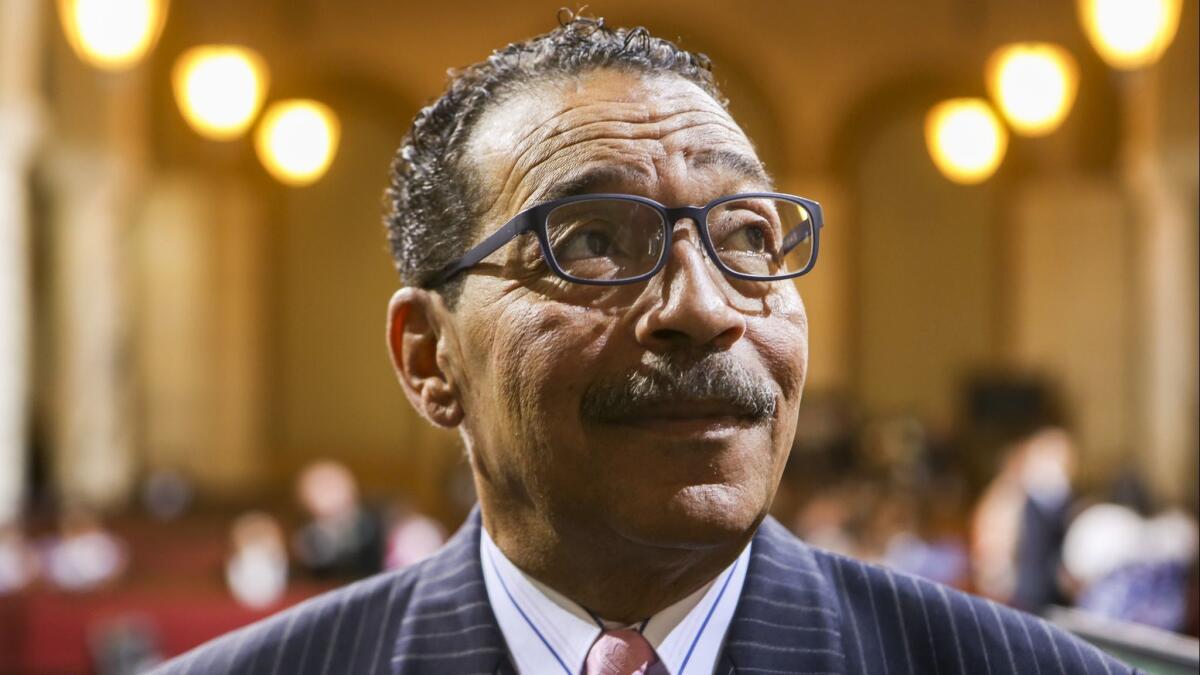Editorial: Police accountability in Los Angeles is heading backwards

After Los Angeles voters approved a ballot measure to remake a key part of the police disciplinary process, City Council President Herb Wesson promised a series of hearings around the city on LAPD reform and the kinds of complaints about policing that have riveted the nation’s attention over the last several years: Excessive force. Dishonesty. Accountability. Discipline. Transparency. There would be ample opportunity for public input. Everything would be done in the open.
“There’s not one subject I want to duck,” Wesson told The Times in May 2017. “I want to look at every aspect of this.”
What a crock.
Nearly two years later, there has been no series of hearings, no citywide debate, no serious review of discipline in the Los Angeles Police Department. Instead, with minimal discussion, the council is about to set in stone a new process by which officers accused of serious misconduct will be able to select appeals panels more to their liking. The chief’s power to fire corrupt, wayward or incompetent officers will be diminished. With Wesson’s invaluable help, the campaign by the Police Protective League — the union of rank-and-file LAPD officers — to pull a fast one on L.A. voters will be complete
The civilians serving on the boards of rights are not ethics watchdogs or even a cross-section of ordinary Angelenos.
It is maddening, and it is ironic. As lawmakers in Sacramento have moved police accountability and transparency a step forward with legislation to finally open officer records to a modicum of public scrutiny, officials in L.A. are striding in the other direction.
The issue here is the Board of Rights. It’s a three-member appeals panel that hears every case in which the chief wants to fire officers or impose long suspensions for dishonesty, bad shootings or other serious misconduct. It is the panel that ultimately keeps in check both the wrongdoing of officers and any unwarranted animus of the chief.
The board includes two LAPD command officers, making it somewhat like a military tribunal — as is appropriate for an armed, uniformed paramilitary force. And there is one civilian, providing an outside check to make sure the police are not merely protecting or persecuting their own. A different board is selected for each case.
The civilian members have proved to be far more lenient on accused police officers than are the uniformed members of the boards, whom the union came to believe were there just to uphold the punishments imposed by the chief.
So to address these concerns, there ought to have been a comprehensive examination of the discipline system, followed by changes that increase the public’s confidence that officers will be held accountable for misconduct and officers’ confidence that they will be treated fairly.
What we got instead was 2017’s Charter Amendment C, which allows accused officers to choose between a traditional Board of Rights and a presumably more lenient one composed exclusively of civilians. The union, Wesson and others marketed the change to voters as improved public accountability. See? More civilians! Voters went for it.
But of course, the civilians serving on the boards of rights are not ethics watchdogs or even a cross-section of ordinary Angelenos. The current pool of hearing officers is overwhelmingly white (27 of 37), disproportionately male (24 of 37) and members of the social class that is least likely to witness or suffer from officer misconduct. That may explain their history of leniency toward officers accused of wrongdoing.
Enter the Fray: First takes on the news of the minute »
The charter amendment won’t take effect until the council acts, and now Wesson has promised some last-minute adjustments to the hearing officer pool. There may be outreach to potential applicants in different communities, diversity of background, actual training. The cases against officers would be argued by deputy city attorneys rather than cops untrained in advocacy. A council committee is due to hear these new proposals on Wednesday and finalize them in April.
That’s good — but it’s not the wide-open discussion on police reform that Wesson promised, and that might have produced more and better ideas for comprehensive LAPD reform.
Wesson said he really intended to have that series of citywide hearings first but is now — after nearly two years of virtual inaction — facing a time crunch. The nature of that crunch? He didn’t specify, so we’ll speculate: It may be that the Police Protective League is getting antsy and wants its all-civilian Board of Rights pronto. That would make what ought to have been a public discussion about accountability and transparency feel like a deal hatched in private.
Follow the Opinion section on Twitter @latimesopinion and Facebook
More to Read
A cure for the common opinion
Get thought-provoking perspectives with our weekly newsletter.
You may occasionally receive promotional content from the Los Angeles Times.










